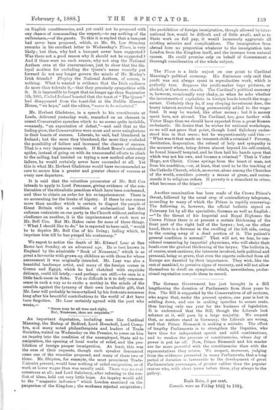The German Government has just brought in a Bill lengthening
the duration of Parliaments from three years to five. The Bill is supported by the Conservatives of all sections, who argue that, under the present system, one year is lost in settling down, and one in making speeches to secure seats, thus leaving only one year for the business of legislation. It is understood that the Bill, though the Liberals look askance at it, will pass by a large majority. We suspect that, as matters stand in Germany, the Liberals are wrong, and that Prince Bismarck is making a mistake. The effect of lengthy Parliaments is to strengthen the Deputies, who have time for independent speech and solid combinations, and to weaken the pressure of constituencies, whose day of power is put far off. Now, Prince Bismarck and his master are far more powerful with the constituencies than with the representatives they return. We suspect, moreover, judging from the evidences presented in many Parliaments, that a long period of duration is favourable to the development of great Parliamentary personages, of greater calibre than the popular orators who, with short terms before them, play always to the gallery.


































 Previous page
Previous page